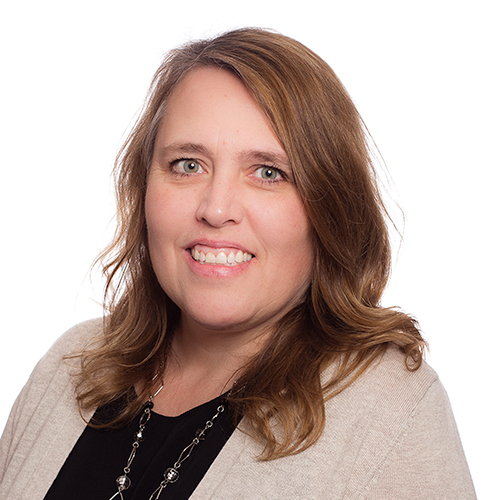Jennifer Cook
Jennifer Cook Residential Lender
Mortgages made easy

Moving's stressful. Your mortgage doesn't have to be.
Your homeownership journey starts here
Jennifer Cook
Phone: 641-521-7725 1907 1st Ave E
Newton, IA 50208
Book an Appointment
Whether you’re exploring a USDA loan, VA loan, FHA loan, or a first time home buyer loan, I’ll guide you through the process with expert advice tailored to your needs. I’ve lived in Iowa all but four years of my life, so this will always be home to me. In my spare time, I love to travel, explore the outdoors, and just hang out with friends and family.
Mortgage Process
Step 1: Qualifying
We'll set up a meeting to determine how much you can afford to borrow so you can start shopping for your dream home.
Step 2: Applying
When you make an offer on your home, you'll complete our formal application in person or through our convenient online platform.
Step 3: Processing
You'll provide final details such as income and insurance while we work on getting your loan underwritten and approved.
Step 4: Closing
We'll meet again so you can sign the final documents and pick up the keys to your new home! From there, we'll take care of the rest.
FAQ
Early in the application process, we’ll help you calculate your mortgage qualification total. With that total in mind, we encourage you to consider what you can afford for monthly payments. You’ll want to consider your budget, current debt, savings goals and upcoming expenses. You can get an idea of how much you can afford with our mortgage calculator.
There are many options to help finance your home. Here are a few to consider:
USDA loan
A USDA loan is a government-backed mortgage for eligible borrowers in rural areas. These loans do not often require a down payment and have income and credit score requirements.VA loan
A VA loan is a government-backed mortgage for eligible veterans, active-duty military and surviving spouses. These loans do not typically require a down payment or private mortgage insurance (PMI).FHA loan
A FHA loan is insured by the Federal Housing Administration (FHA). It allows borrowers with lower credit scores make a smaller down payment than traditional loans. These loans require mortgage insurance premiums and have property and appraisal requirements.First Time Home Buyer loan
A first time home buyer loan isn’t a specific loan but an umbrella term to describe a type of loan. These loans help buyers who need lower down payments and flexible credit requirements. These loans can include USDA loans, VA loans, FHA loans and state-specific loan programs.First time home buyers in Iowa may qualify for the FirstHome Program through the Iowa Finance Authority.
First time home buyers in Minnesota may qualify for the Start Up and Step Up Programs depending if you are a first time or repeat homebuyer.
There are other ways to finance your home outside of these programs. We’d be happy to walk you through what options might be best for your current situation.
A fixed-rate mortgage locks in the same interest rate for the entire life of the loan. This means your principal and interest payments remain predictable, though other factors like property taxes or insurance premiums could cause fluctuations in your total monthly payment. Fixed-rate mortgages are ideal for buyers who want stability and consistency in their payments, making it easier to budget over the long term. This type of mortgage is especially beneficial if you plan to stay in your home for many years.
An adjusted-rate (ARM) typically starts with a lower fixed interest rate for a set period (e.g., 5, 7, or 10 years). After this introductory period, the interest rate adjusts periodically based on market conditions, which can cause your monthly payment to increase or decrease. ARMs often start with lower initial rates than fixed-rate mortgages, which can save you money in the short term. This makes them a good option if you plan to sell your home, refinance before the rate adjusts, or make larger payments while the introductory rate is low. However, ARMs come with the risk of payment uncertainty after the adjustment period.
Typically, the larger your down payment, the lower your interest rate can be. If you’re unable to make a 20% down payment, you may qualify for a loan program like a USDA loan, VA loan, or FHA loan.
There are other expenses that may impact this decision. You’ll want to consider closing fees, moving costs and house repairs in this decision. We’d be happy to review your unique circumstance and how a down payment could impact your interest rate. We’re here to help find the best loan for your life stage and financial goals.
It depends on your budget and payment goals. Typically, rates tend to be lower for 15 year versus 30 year loans. Monthly payments will be higher for a 15 year loan compared to a 30 year loan.
If it’s in your budget to make those larger payments, you will pay less in interest over the length, or term, of your 15 year loan. During the mortgage application process, we can help you figure out what would work best for you and your budget.
Credit score is one piece of the mortgage application process. Higher credit scores can lead to better rates and more options. There are home loan options for people with lower credit scores. Below are credit score ranges to help gauge where you are:
| Score | Range |
|---|---|
| Excellent | 800-850 |
| Very Good | 740-799 |
| Good | 670-739 |
| Fair | 580-669 |
| Poor | 300-579 |

 How much of a mortgage can I afford?
How much of a mortgage can I afford?